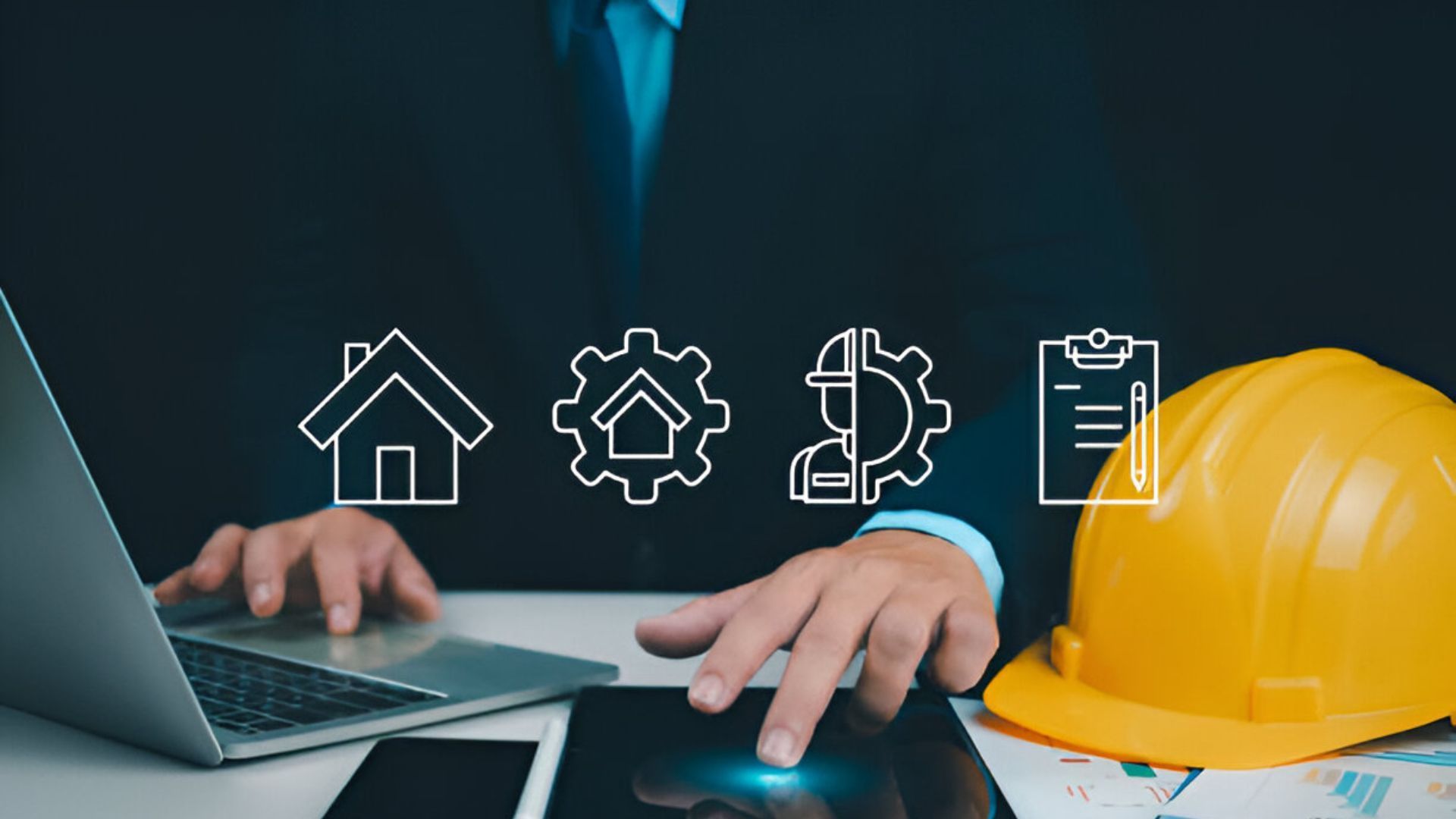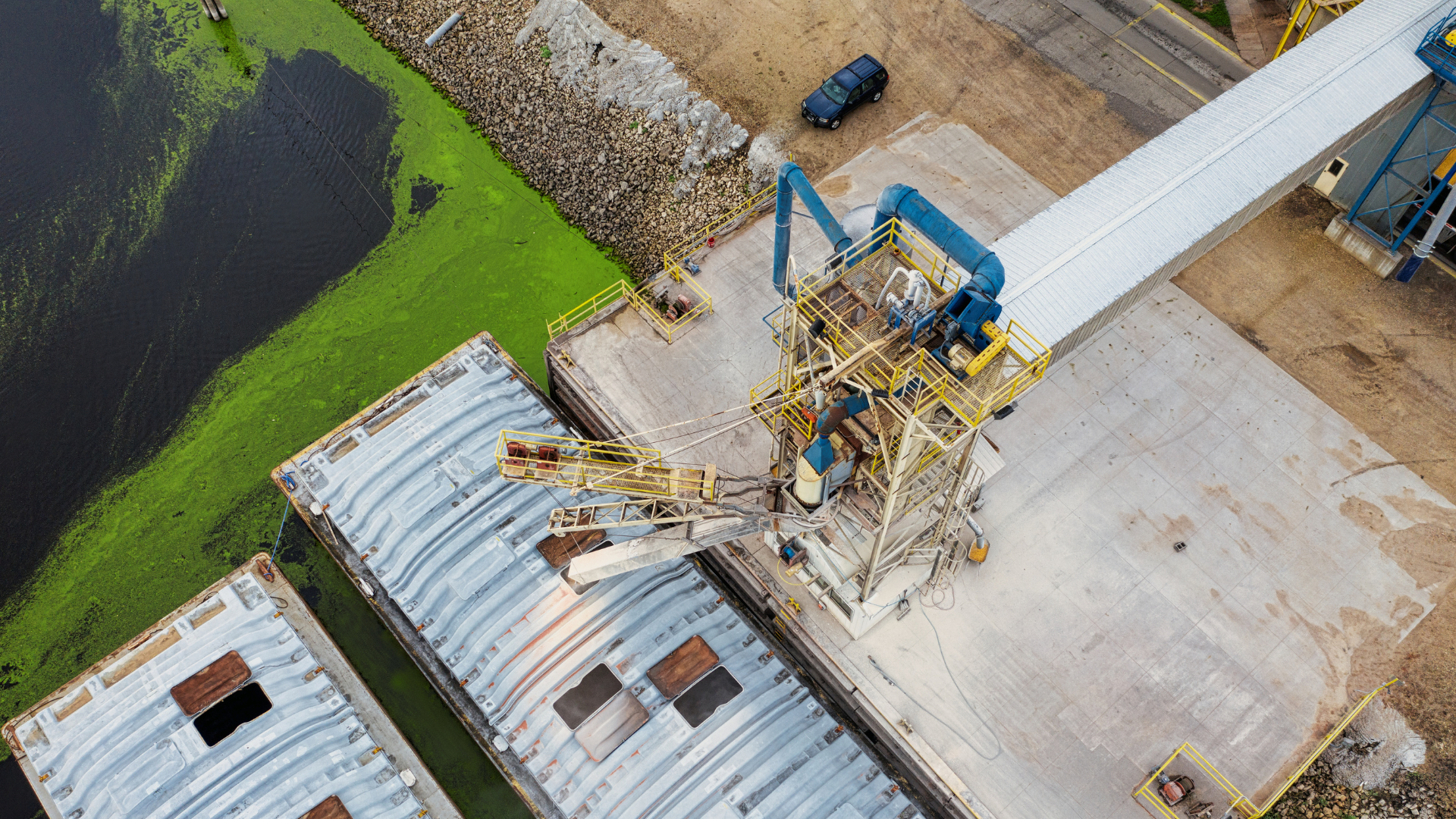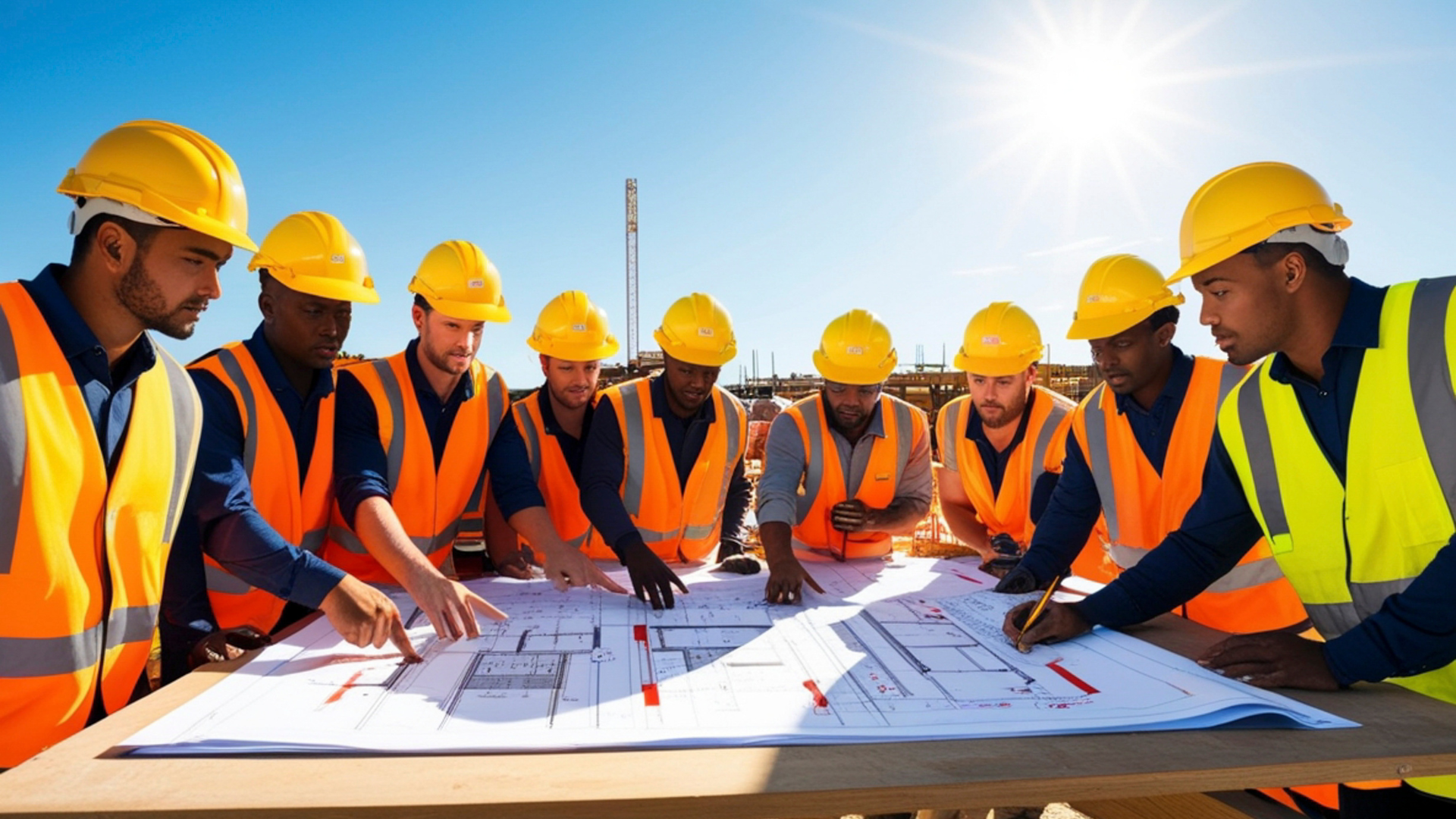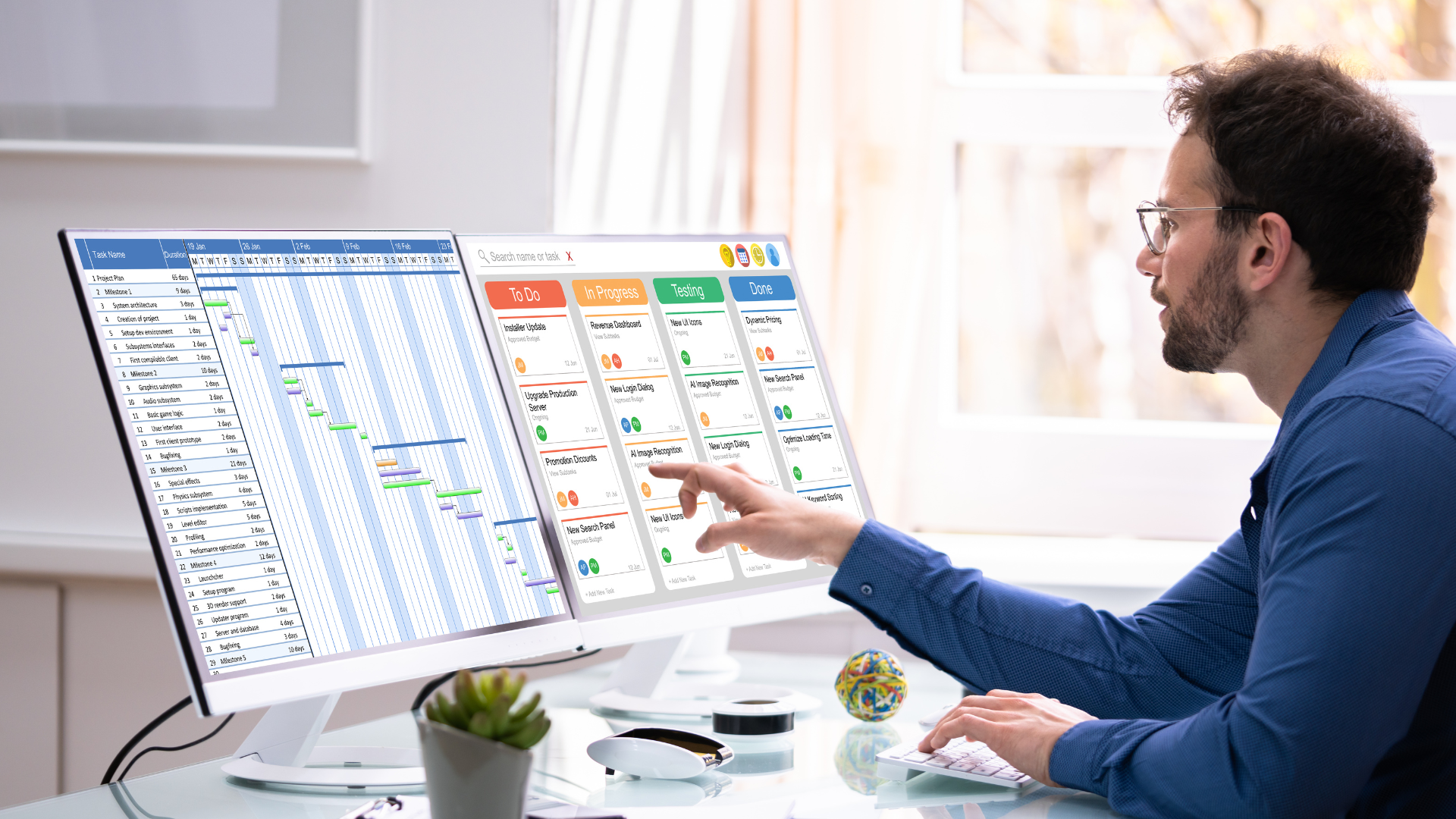Imagine you’re a homeowner who values client relationships. You’ve signed the contract, made the deposit, and now you’re waiting for your kitchen remodel to begin. Days go by. No word from the contractor. No updates. Just silence. Sound familiar?
Miscommunication and delays are far too common in the construction industry when effective communication tools are not utilized.
For decades, homeowners and commercial clients alike have endured a frustrating lack of transparency. But that’s changing.
With the latest generation of construction CRM tools boasting essential features, communication between construction firms and their clients is finally advancing. These tools reshape the construction process's tracking, sharing, and experience. Let's discover more!
Key Takeaways
- In contrast to generic CRMs, CRMs tailored for construction provide features for managing job sites, planning projects, and enhancing the performance of construction teams.
- CRM tools streamline operations, centralize data, and build trust with clients.
- With platforms like Constructionbase, construction companies are seeing happier clients and a smoother sales process.
What Is a Construction CRM? And Why You Can’t Use a Generic One
A construction CRM (Customer Relationship Management) software is a purpose-built platform that helps construction companies manage customer interactions effectively, from initial lead to final invoice.
Unlike traditional CRM systems built for retail or SaaS, a CRM designed for construction comes with tools specifically tailored to manage job sites, project planning, and construction teams, while enhancing business performance.
Generic CRM vs Construction CRM
| Feature | Generic CRM | Construction CRM |
|---|---|---|
| Lead Management | Yes | Yes (with pre-construction tracking) |
| Sales Pipeline | General | Tailored for builders' pipeline CRM |
| Project Tracking | Basic | Real-time job progress updates |
| Client Communication | Email-focused | Multi-channel with milestones |
| Document Management | Limited | Integrated proposals, permits, and digital signatures |
| Mobile App | Often optional | Essential for job site updates |
| Project Milestones | Manual | Automated with visual dashboards |
| Field Team Integration | Rare | Built-in with photo upload and logs |
Why Construction Needs Its Own System
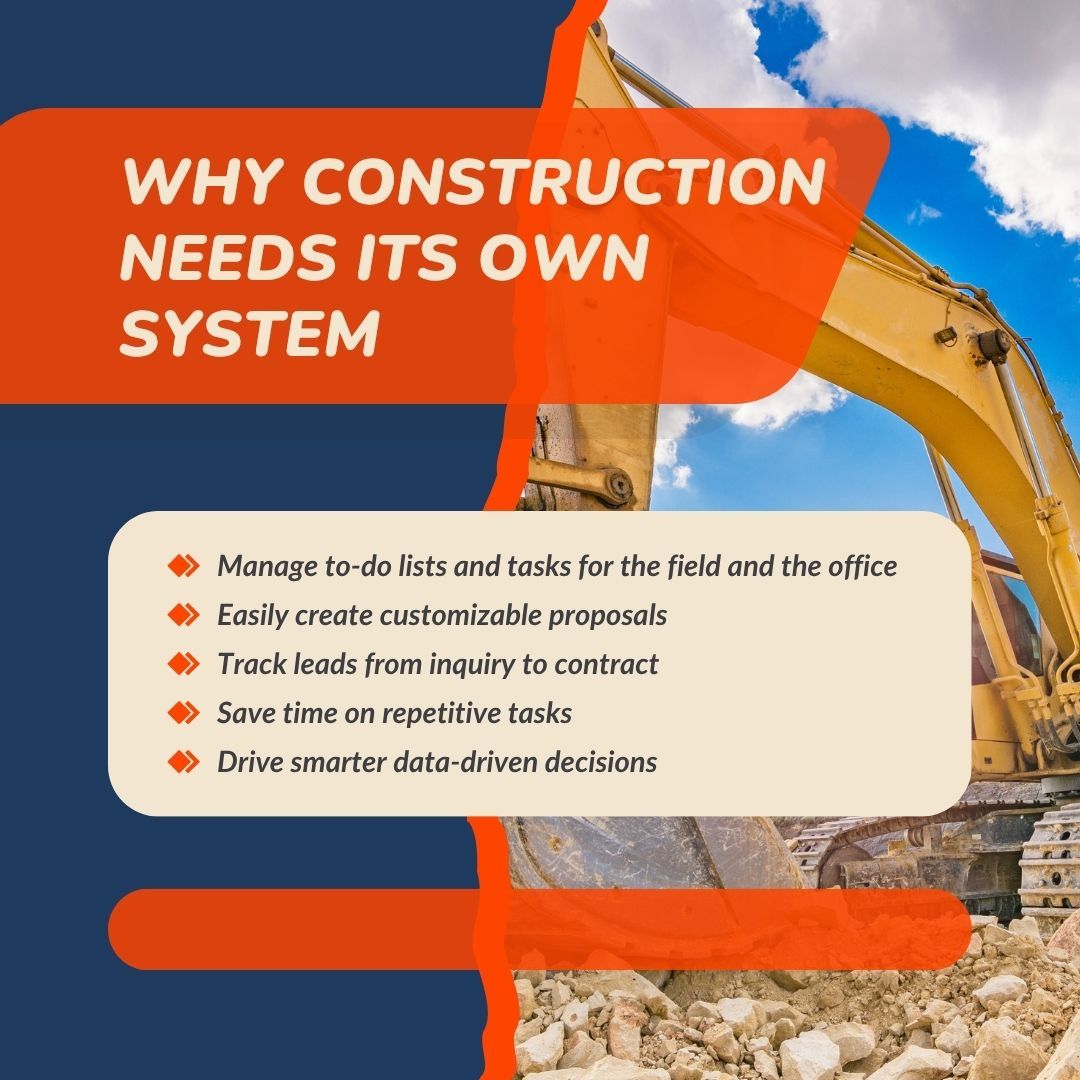
Construction is more complicated than you might expect. It involves multiple projects, scattered teams, critical documents, and evolving scopes. You need a centralized system to streamline processes and save valuable time to stay on the same page, something you won’t get with generic CRM tools.
A tailored construction CRM like Constructionbase software helps manage projects efficiently :
- Manage to-do lists and tasks for the field and the office
- Easily create customizable proposals
- Track leads from inquiry to contract
- Save time on repetitive tasks
- Drive smarter data-driven decisions
The Old Way: Communication Gaps That Cost You
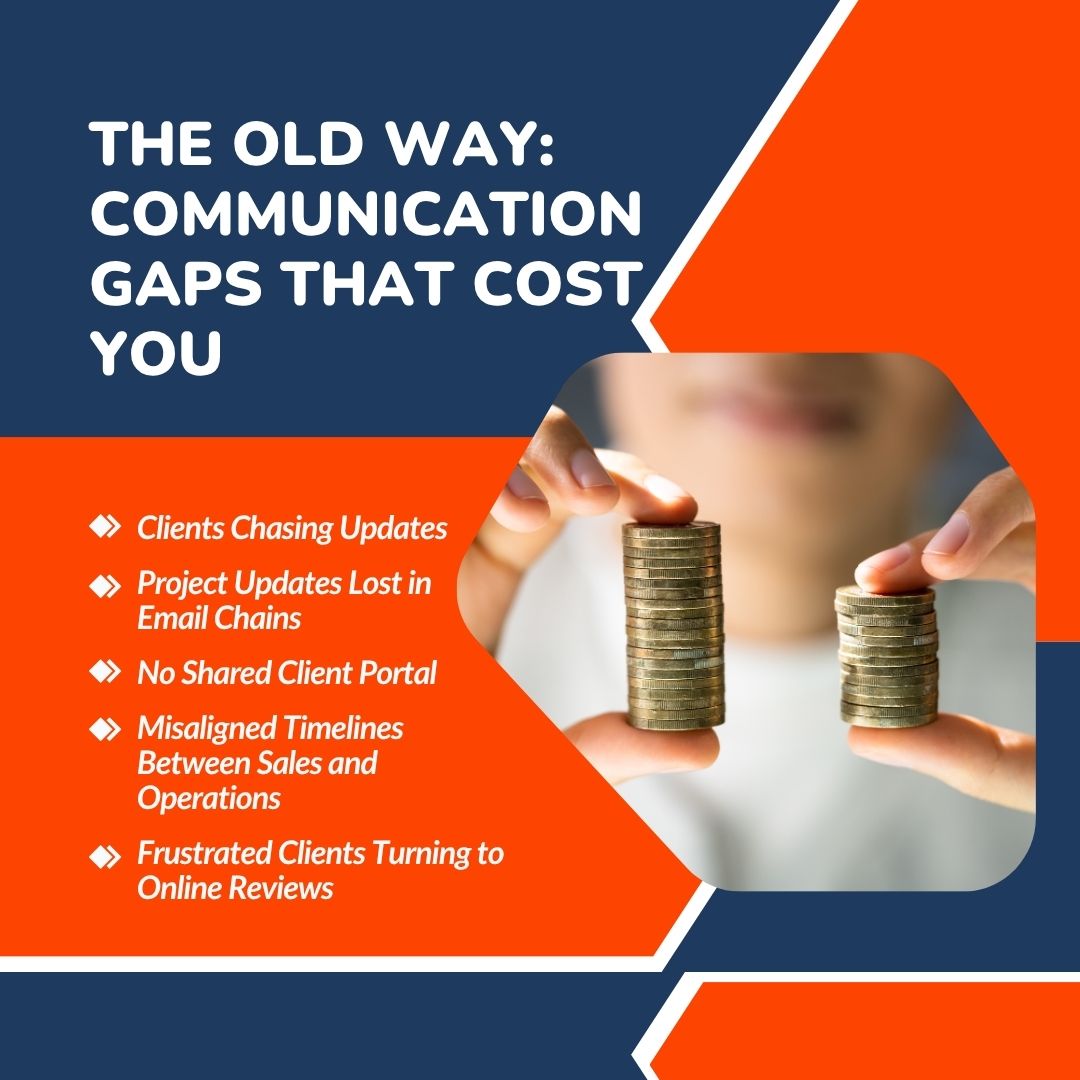
Before CRM tools came into play, client communication in construction looked something like this:
1. Clients Chasing Updates
Homeowners and property managers were often left in the dark. With no clear line of communication, they’d resort to repeated phone calls, emails, or even site visits just to ask, “What’s going on with my project?”
2. Project Updates Lost in Email Chains
Important progress updates, approvals, and photos would often get buried in endless email threads, spread across different team members, and frequently lacked context. When clients asked for the latest status, no one could give a quick, confident answer.
3. No Shared Client Portal
There was no centralized place for clients to log in and see their project’s status. This meant every update had to be manually shared, often leading to missed details, inconsistencies, and duplicated effort.
4. Misaligned Timelines Between Sales and Operations
The sales team might promise one thing during the close, say, a start date or project scope, only for the operations team to deliver something else entirely.
Without a shared system, critical details fell through the cracks during handoffs.
5. Frustrated Clients Turning to Online Reviews
When communication broke down and expectations weren’t met, unhappy clients didn’t just go silent; they went public. Negative reviews, complaints on social media, and lost referrals became the norm rather than the exception.
These gaps slow down projects, hurt reputations, and cost businesses more jobs.
The New Way: How Modern Construction CRMs Are Fixing It
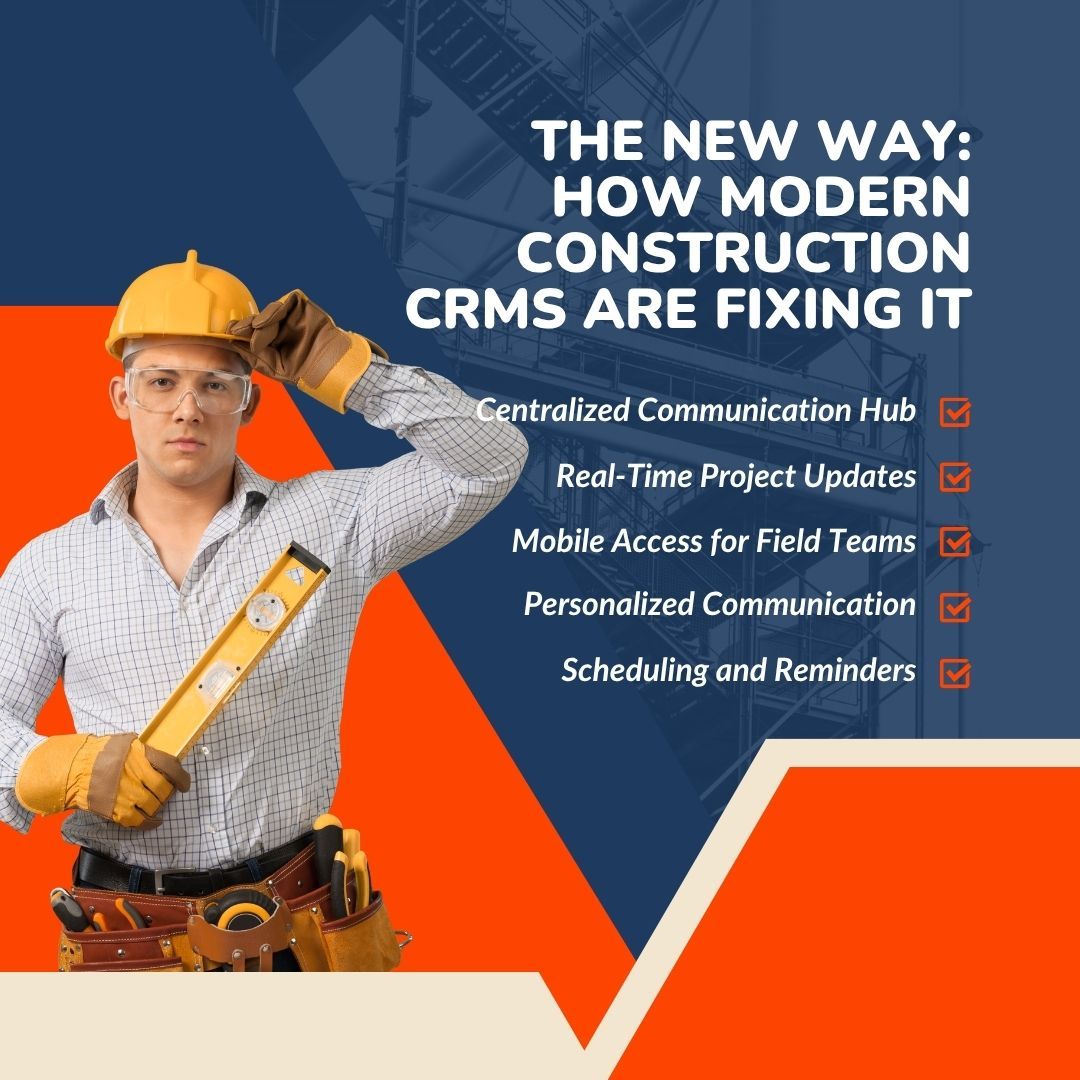
Modern CRM solutions for construction platforms address these issues by simplifying, automating, and centralizing communication, thereby driving revenue and enabling more informed decision-making. Here's how:
1. Centralized Communication Hub
All communication happens in one place. Whether it's sales, project managers, or field workers, everyone can communicate and share updates through the CRM.
No more lost emails, leading to faster payments for clients. Just one source of truth.
2. Real-Time Project Updates
Clients can log into their customer portal and instantly see their options for:
- Photos
- Progress bars
- Completed milestones
- Transactions
- Upcoming work
This level of transparency builds trust and reduces the need for phone calls.
3. Mobile Access for Field Teams
From the job site, workers can:
- Upload progress photos
- Log daily reports
- Send client updates
The mobile app bridges the gap between office and field, streamlining team performance.
4. Personalized Communication
Whether it’s an automated message about a milestone or a scheduled follow-up, communication feels tailored to the client’s experience because it is.
CRM tools track customer interactions to ensure that nothing slips through the cracks.
5. Scheduling and Reminders
With automated reminders and calendars:
- No more missed meetings
- Everyone stays accountable
- Time is saved, and more deals close faster
For more information, go through What is Construction CRM and Why Every General Contractor Should Have One in 2025
Tangible Benefits for Construction Companies
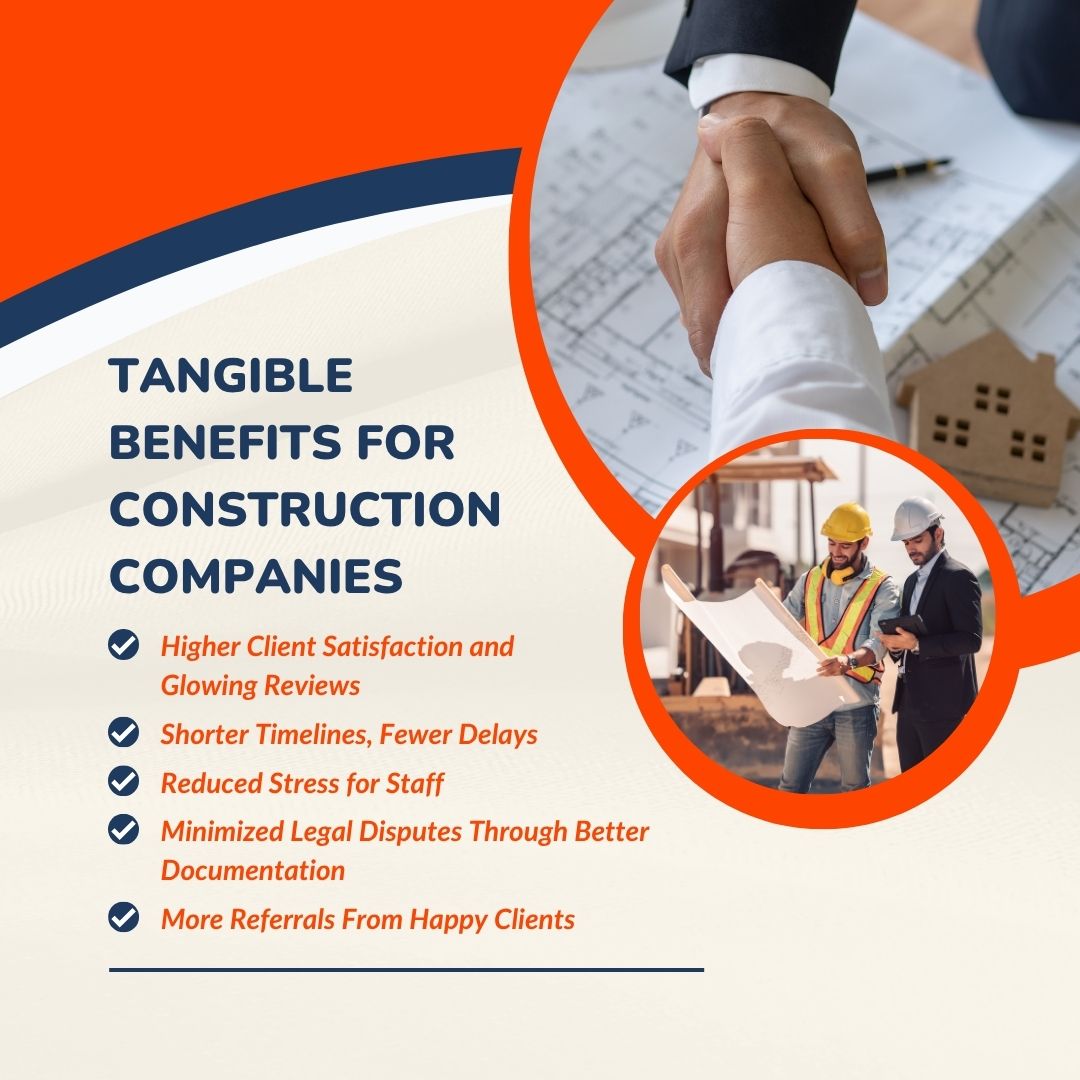
Let's explore this in detail:
1. Higher Client Satisfaction and Glowing Reviews
A construction CRM helps teams keep clients informed with regular updates, milestone notifications, and easy-to-access client portals.
When homeowners or commercial clients don’t have to chase down information or worry about being left in the dark, they’re happier. Happy clients leave 5-star reviews, refer others, and trust you with their next big project.
2. Shorter Timelines, Fewer Delays
Miscommunication, unclear handoffs, or lost paperwork often cause project delays. With a centralized system that ties everything together, tasks, files, approvals, and schedules, your team can avoid unnecessary slowdowns.
Automated reminders and shared calendars help keep everyone on track, from the first blueprint to the final walkthrough.
3. Reduced Stress for Staff
From sales reps to superintendents, every person on your team benefits when you eliminate scattered information and streamline the sales process.
Instead of juggling calls, texts, emails, and spreadsheets, your staff gets a clear, organized view of what’s happening across all projects. That means fewer headaches, better collaboration, and less burnout.
4. Minimized Legal Disputes Through Better Documentation
Every update, photo, task change, or client message is logged automatically in a good construction CRM. That historical data serves as a safety net in the event of misunderstandings or disputes.
If a client ever questions progress or terms, you have a complete digital paper trail; no need to scramble for old emails or sticky notes.
5. More Referrals From Happy Clients
When clients have a positive experience, especially in an industry where expectations are often low, they tend to share their positive feedback. A construction CRM like Constructionbase provides the tools to exceed those expectations through proactive communication, transparency, and professionalism.
The result? More word-of-mouth referrals, glowing testimonials, and long-term growth without extra marketing spend.
To understand the importance of Construction CRM, check out Why Construction CRM Is Necessary (Not Just Optional) in 2025.
Real-World Scenario: Before and After CRM
Before:
- A client sends a text asking for updates.
- The project manager isn’t sure of the current job status.
- The field team forgets to upload photos.
- The client leaves a 3-star review.
After (With Construction CRM):
- The client logs into the portal.
- Sees photos from today’s work.
- Milestone Installation marked as 60% complete.
- CRM sends an automated message about tomorrow’s schedule.
- Client gives a 5-star review and refers a friend.
If you want your team to know more about CRM, then here's how you can train them. Training Your Team to Fully Utilize Construction CRM Benefits
Where Is Construction CRM Going Next?
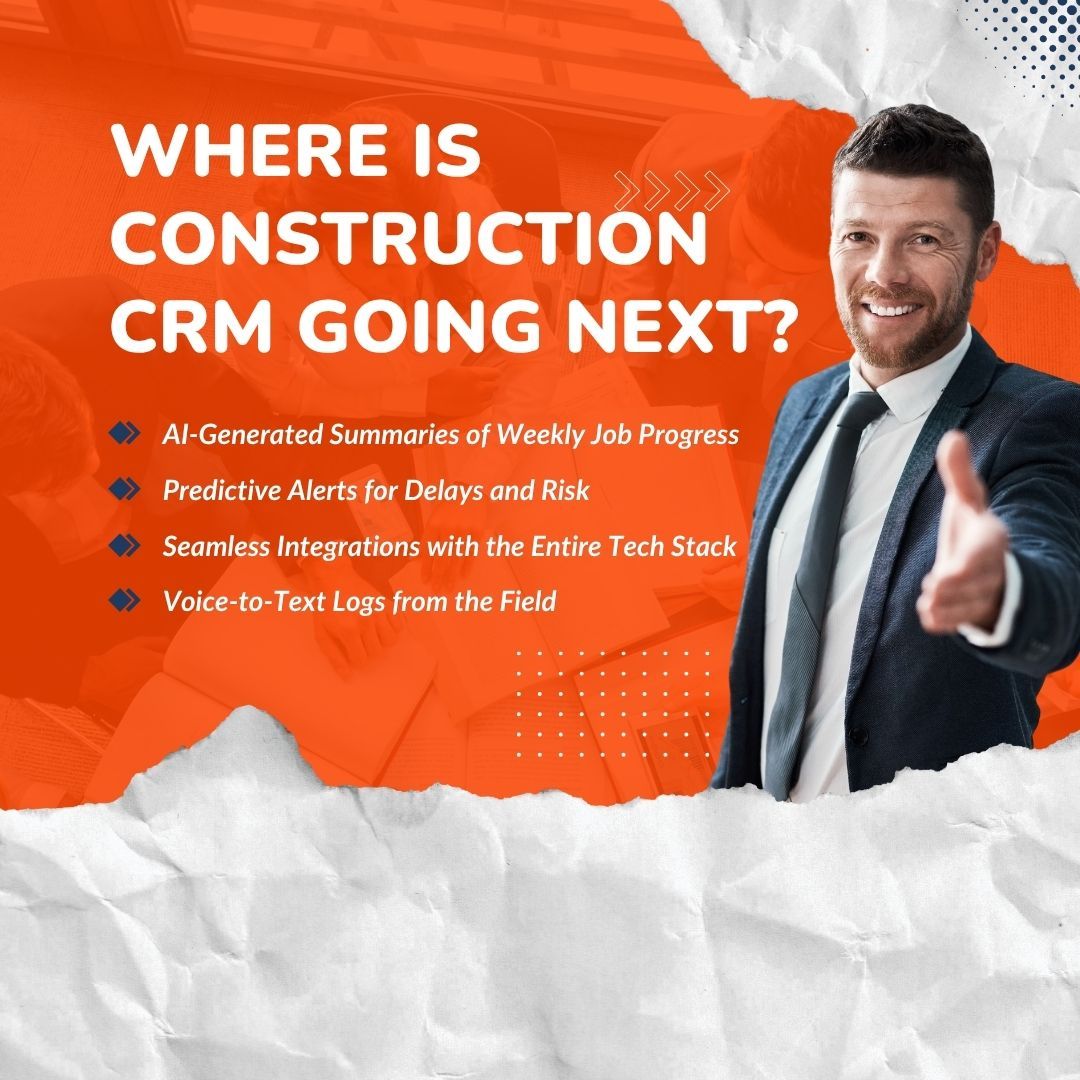
Expect CRM software to get even smarter:
1. AI-Generated Summaries of Weekly Job Progress
No more manually piecing together updates from field notes, texts, and emails. Future-ready CRM software will automatically generate polished, easy-to-read weekly summaries.
These AI-powered reports pull data from your job site activities, daily logs, and team updates to provide clients with real-time clarity, without draining your team’s time.
2. Predictive Alerts for Delays and Risk
CRMs are becoming proactive partners in your projects. Using data from past projects, current timelines, and team input, modern systems will soon be able to predict when a project may fall behind schedule or exceed budget.
These alerts help you course-correct early, before minor hiccups become significant issues.
3. Seamless Integrations with the Entire Tech Stack
The days of juggling five different platforms are behind us. Next-gen construction CRM software is integrating directly with billing tools, permitting systems, design platforms, and financial management solutions.
That means fewer double entries, fewer errors, and a more connected view of your entire construction process from sales to closeout.
4. Voice-to-Text Logs from the Field
Field teams will no longer have to pause work to type out updates. With voice-to-text functionality, workers can log site notes, flag issues, and update project milestones simply by speaking into their mobile app.
It’s faster, safer, and more accurate, especially for teams working hands-on in busy job site conditions.
These improvements will only make it easier for construction businesses to deliver a premium client experience.
Spotlight: Why Constructionbase Deserves Your Attention

Constructionbase is a next-gen, AI-powered construction CRM that’s built from the ground up for modern home builders.
Why It Stands Out:
- Smart, Automated Communication Flows
No more chasing down updates or playing phone tag. Automated messages, milestone alerts, and progress updates keep everyone informed, without requiring extra effort from your team. - Drag-and-Drop Project Tracking
Easily move tasks, reassign responsibilities, and update project timelines with a simple drag-and-drop interface. Whether you're in the office or on-site, adjusting timelines and schedules is intuitive and fast. - Seamless Handoffs from Sales to Operations
Transitioning from closing the deal to starting the build often gets messy. Constructionbase bridges the gap by centralizing client data and task assignments, ensuring that no details are lost as they flow seamlessly from sales into project management. - Intuitive, User-Friendly Interface
A CRM is only helpful if your team uses it. Constructionbase’s clean design makes it easy for every department, from estimators to field crews, to adopt and navigate. It’s powerful without being overwhelming. - Real-Time Notifications and AI-Generated Updates
Stay ahead of delays and miscommunications. Constructionbase uses AI to summarize daily progress, flag potential risks, and automatically update clients with personalized messages and photos.
Imagine this: A client logs in and instantly sees their kitchen renovation is 80% done, complete with progress photos and a timeline. No need to call. No anxiety. Just clarity.
Constructionbase doesn’t just keep projects moving; it keeps clients happy.
Final Thoughts
The construction industry doesn’t have a communication problem; it has a tool problem that prevents firms from effectively managing leads.
With the proper construction CRM, firms can close the gap, streamline work, and delight clients from day one.
To achieve better reviews, faster payments, and more referrals, start with effective communication. Start with Constructionbase!
Ready to Improve Client Communication?
If your construction firm is still juggling spreadsheets and scattered emails, it’s time for an upgrade. The best construction CRM tool, such as
Constructionbase is more affordable and powerful than ever.
Book a demo today and see how you can streamline client communication, increase productivity, and win more jobs.
FAQ
Q1: What is a construction CRM?
It’s a platform tailored for construction companies to manage client communication, customer relationship management, project management, and business operations.
Q2: Why choose a specialized CRM over a generic one for the construction industry?
Generic CRM are not designed for the construction industry, and you will find yourself customizing endlessly. A purpose-built CRM functions effectively right out of the box for construction.
Q3: How does a construction CRM improve communication?
An industry-specific CRM for construction centralizes updates, automates messaging, tracks job status, and provides clients with a portal to stay informed.
Q4: Is it capable of managing multiple clients?
Absolutely, Construction CRM software like Constructionbase helps in customer management, tracking leads, and overseeing multiple projects within your pipeline.
Have questions or need personalized advice?
Talk to an Expert Today and let our construction specialists guide you to success.

